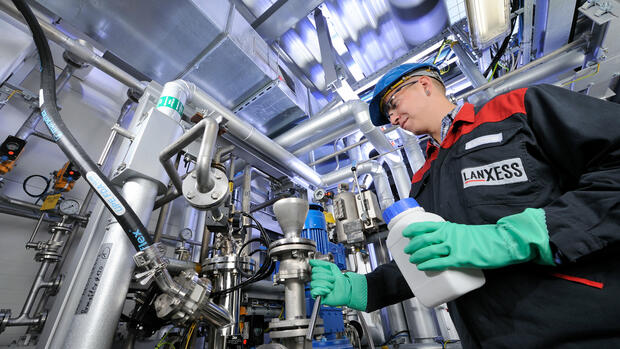The group manufactures ion exchangers for water treatment there.
(Photo: Lanxess)
Dusseldorf After a weak start to the year, there are no signs of any noticeable recovery in the German chemical industry. “Chemistry is in troubled waters, and that will remain the case in the first half of the year,” said Matthias Zachert, CEO of the Cologne-based specialty chemicals group Lanxess, on Wednesday at the quarterly balance sheet.
With regard to the second half of 2023, however, Zachert was confident. Like many other chemical companies, Lanxess relies primarily on China. But there too, the recovery hoped for at the beginning of the year failed to materialise, as the results and assessments of Evonik, Covestro and BASF have already shown.
“We continue to see a clear reluctance among customers,” explained Zachert. Stocks would continue to be reduced instead of ordering new goods. Lanxess’ sales were stable in the first quarter, but the quantities sold declined. Adjusted profit fell 28 percent to 189 million euros.
Storage effect across the industry
The storage effect described by Zachert has been observed throughout the chemical industry for months. Customers from the processing industry remain cautious in the uncertain overall economic situation. For the currently clear order situation, they use up their own stocks before they generate further costs.
Last year, companies filled up their warehouses in anticipation of a strong 2023. That didn’t happen. A second reason why consumers are currently reluctant to buy is that companies are expecting price reductions in the coming weeks.
The Essen-based chemicals dealer Brenntag also spoke on Wednesday of ongoing destocking among customers. “However, we expect this effect to subside in the second quarter and the situation to improve month by month,” said CEO Christian Kohlpaintner. In the first quarter, the operating profit of the Dax group fell by 13.1 percent to 345.1 million euros.
Just like BASF CEO Martin Brudermüller, Kohlpaintner also warns against overly high expectations for the second quarter. It is evident everywhere that the large chemical companies have practically already ticked off the first half of 2023. At Evonik, which presented figures on Tuesday, sales volumes fell by 14 percent and adjusted profit fell by 44 percent to 409 million euros.
The situation in the chemical industry is also a clear signal for the general economy, since the industry supplies almost all manufacturing segments. The industry had not expected much from the demand in Europe and the USA at the beginning of the year anyway – unlike from Asia and especially China after the end of the strict Covid 19 measures.
After the end of the Covid restrictions, the Chinese travel more again.
(Photo: Reuters)
In China, consumption picked up in the first quarter. But the Chinese initially prefer to go to the cinema, travel or use other long-missing services – instead of buying goods that are important for the chemical industry, observes industry expert Markus Mayer from Baader Bank. These include electronic products or cars. The construction industry, which is important for the chemical industry, was also in poor shape in China.
This is clearly reflected in the overall economic figures: the gross domestic product of the People’s Republic grew in the first quarter. Exports from German industry to the country fell by 12 percent to 24 billion euros over the same period, according to current calculations by the Federal Statistical Office. The manufacturing industry in Germany produced 2.4 percent less in March. The local industry thus took practically no part in the consumption-driven growth in China.
So far, no chemical company has cashed in on the profit forecast
“The price question is whether there will actually be an economic breakthrough in the second half of the year,” says analyst Mayer. For Europe’s economy, chemical companies have little hope of major growth due to high inflation and energy costs. Despite government incentives such as billions in investments under the Inflation Reduction Act (IRA), the prospects in the USA are uncertain.
So China has to fix it. Brenntag boss Kohlpaintner was disappointed by the situation there: “We had expected production to ramp up more quickly,” he said. “But we assume that this will happen gradually in the coming months.” That would then become the driver for demand in the chemical industry and would have positive effects on other Asian markets.
The outlook of Lanxess CEO Zachert, whose contract has just been extended by another five years to 2029, is also based on this expectation. He is convinced that growing consumption in China will be followed by an increase in production in the second half of the year. That would be important for all chemical companies in order to achieve the overall goals for 2023. So far, none of the major manufacturers have cut earnings forecasts.
More: Steel and chemical managers warn: “Without an industrial electricity price, emigration is inevitable”

